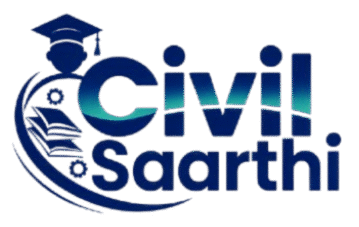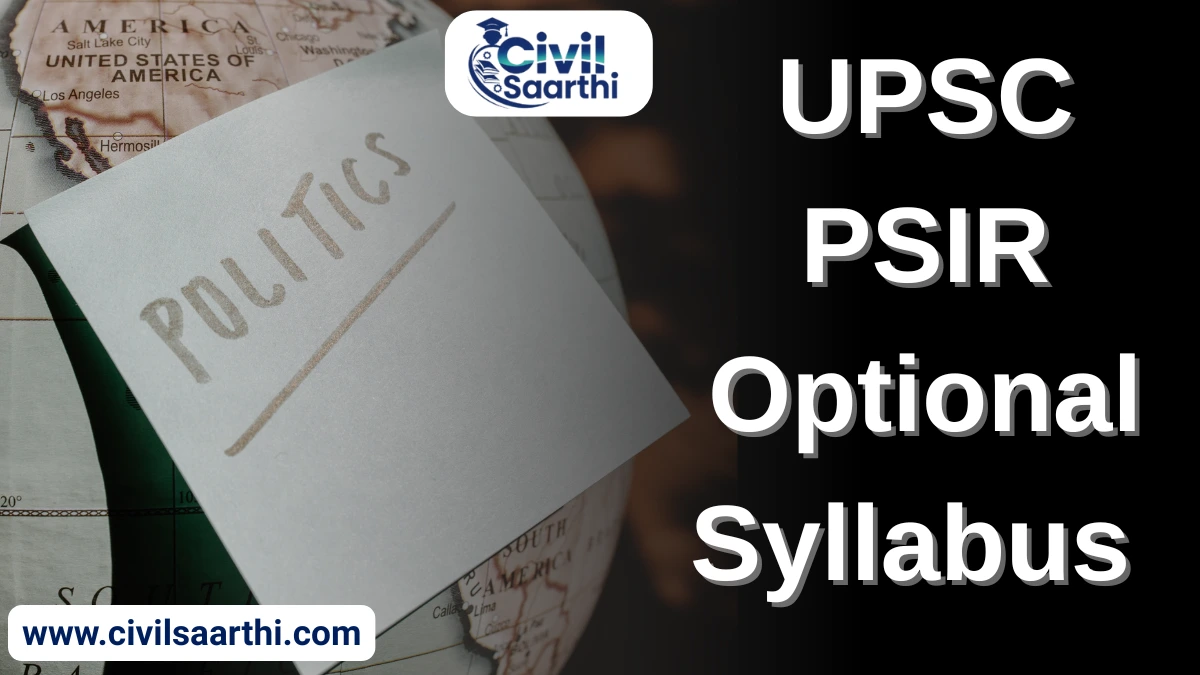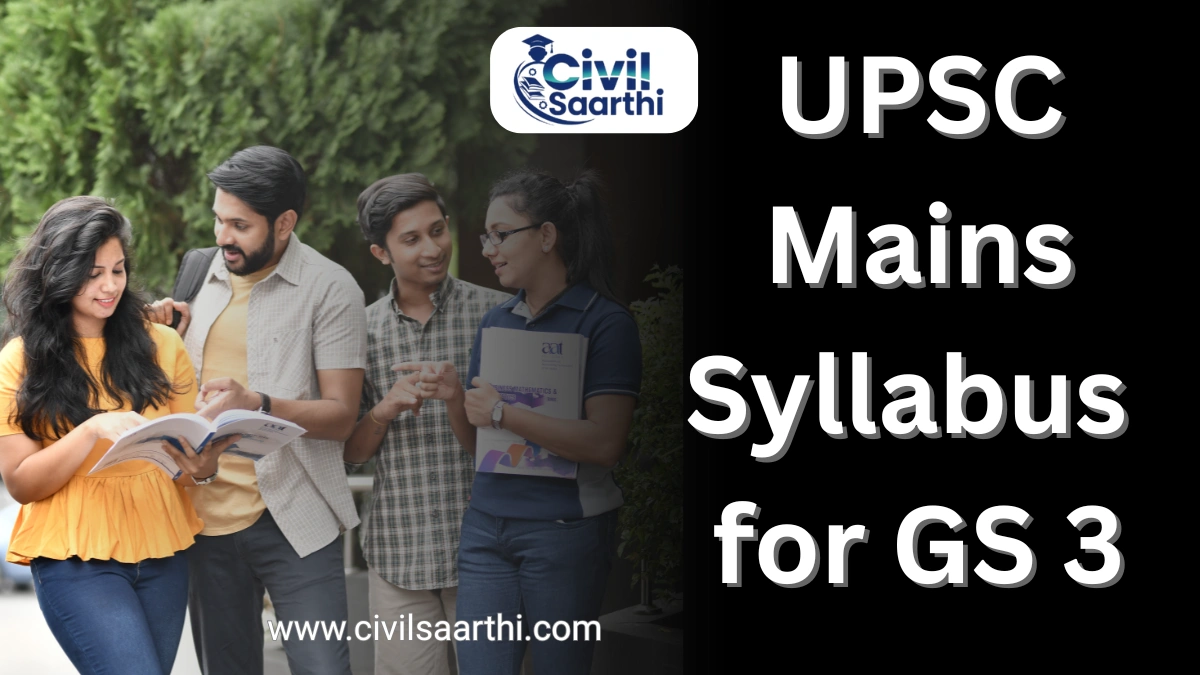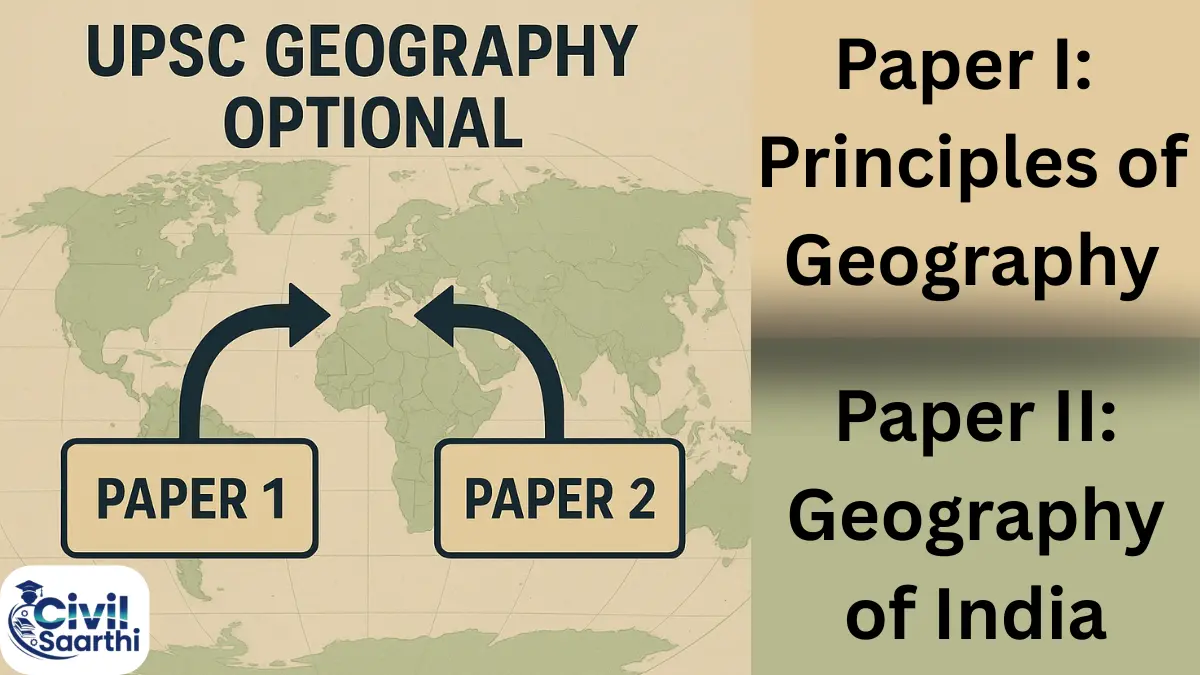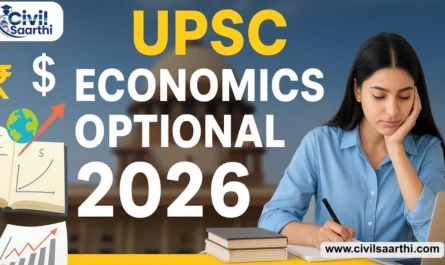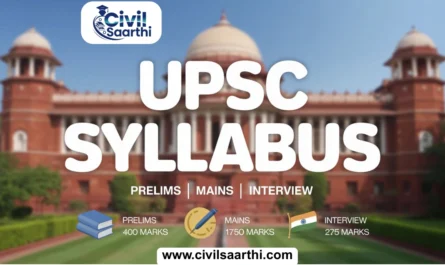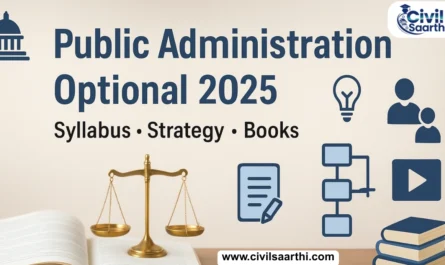The UPSC PSIR Optional Syllabus is important for candidates opting for Political Science and International Relations as their optional subject in the Civil Services Examination. This syllabus encompasses a wide range of topics, including political theories, Indian politics, comparative politics, and international relations. A detailed understanding of the syllabus is essential for effective preparation and success in the examination which is provided below.
UPSC PSIR Optional Syllabus
The UPSC PSIR Optional Syllabus covers a rich mix of classical and modern political thought, constitutional and institutional details, comparative political theories, and contemporary international affairs. This makes it a versatile optional with overlap in GS Papers I, II, and IV, as well as in Essay and Interview stages.
UPSC PSIR Optional Syllabus Overview
The UPSC PSIR Optional Syllabus is divided into two papers, each carrying 250 marks, making a total of 500 marks. The table below gives an overview of the syllabus.
UPSC PSIR Optional Syllabus Overview | ||
| Paper | Subject Area | Marks |
| I | Political Theory and Indian Politics | 250 |
| II | Comparative Politics and International Relations | 250 |
UPSC PSIR Optional Syllabus for Paper 1
UPSC PSIR Optional Syllabus for Paper 1 focuses on political theories, thinkers, ideologies, and the structure and functioning of the Indian political system. This paper is divided into two parts: Political Theory and Indian Government & Politics. The detailed syllabus has been discussed below.
PSIR Paper I Part A – Political Theory and Indian Politics
Paper I of the UPSC PSIR Optional Syllabus covers Political Theory and Indian Government & Politics. It includes foundational concepts like justice, equality, liberty, rights, democracy, and political ideologies.
PSIR Paper I Part A – Political Theory and Indian Politics | |
| Topic Area | Detailed Syllabus Content |
| Political Theory | Meaning and approaches |
| Theories of State | Liberal, Neo-liberal, Marxist, Pluralist, Post-colonial, and Feminist theories of the state |
| Justice | Conceptions of justice with special reference to Rawl’s theory of justice and its communitarian critiques |
| Equality | Social, political and economic; relationship between equality and freedom; Affirmative action |
| Rights | Meaning and theories; different kinds of rights; Concept of Human Rights |
| Democracy | Classical and contemporary theories; different models of democracy—representative, participatory, and deliberative |
| Concept of Power | Concept of power: hegemony, ideology and legitimacy |
| Political Ideologies | Liberalism, Socialism, Marxism, Fascism, Gandhism and Feminism |
| Indian Political Thought | Dharamshastra, Arthashastra and Buddhist Traditions; Sir Syed Ahmed Khan, Sri Aurobindo, M. K. Gandhi, B. R. Ambedkar, M. N. Roy |
| Western Political Thought | Plato, Aristotle, Machiavelli, Hobbes, Locke, John S. Mill, Marx, Gramsci, Hannah Arendt |
PSIR Paper I Part B – Indian Government and Politics
Paper I – Indian Government and Politics focuses on the structure, functioning, and dynamics of the Indian political system. It covers the Constitution, federalism, organs of government, political parties, electoral processes, and major political ideologies shaping India.
PSIR Paper I Part B – Indian Government and Politics | |
| Topic Area | Detailed Syllabus Content |
| Indian Nationalism | Political Strategies of India’s Freedom Struggle:
Perspectives on National Movement – Liberal, Socialist and Marxist; Radical Humanist and Dalit |
| Making of the Indian Constitution | Legacies of British rule; different social and political perspectives |
| Salient Features of the Constitution | The Preamble, Fundamental Rights and Duties, Directive Principles; Parliamentary System and Amendment Procedures; Judicial Review and Basic Structure doctrine |
| Union Government – Principal Organs | Envisaged role and actual working of the Executive, Legislature and Supreme Court |
| State Government – Principal Organs | Envisaged role and actual working of the Executive, Legislature and High Courts |
| Grassroots Democracy | Panchayati Raj and Municipal Government; Significance of 73rd and 74th Amendments; Grassroot movements |
| Statutory Institutions / Commissions | Election Commission, Comptroller and Auditor General, Finance Commission, Union Public Service Commission, National Commission for Scheduled Castes, National Commission for Scheduled Tribes, National Commission for Women; National Human Rights Commission, National Commission for Minorities, National Backward Classes Commission |
| Federalism | Constitutional provisions; changing nature of centre-state relations; integrationist tendencies and regional aspirations; inter-state disputes |
| Planning and Economic Development | Nehruvian and Gandhian perspectives; Role of planning and public sector; Green Revolution, land reforms and agrarian relations; liberalization and economic reforms |
| Caste, Religion and Ethnicity | Caste, Religion and Ethnicity in Indian Politics |
| Party System | National and regional political parties, ideological and social bases of parties; Patterns of coalition politics; Pressure groups, trends in electoral behaviour; changing socio-economic profile of Legislators |
| Social Movements | Civil liberties and human rights movements; women’s movements; environmentalist movements |
UPSC PSIR Optional Syllabus for Paper II
Paper II of the UPSC PSIR Optional Syllabus focuses on comparative political systems and India’s international relations.It explores political ideologies, state systems, global governance, and major theories of international politics.
PSIR Paper II Section A – Comparative Politics and International Politics
Paper II begins with Comparative Politics, which is about comparing political systems across the world. This section of the UPSC PSIR Optional Syllabus covers diverse political systems, forms of governance, and global political ideologies.
PSIR Paper II Section A – Comparative Politics and International Politics | |
| Topic Area | Detailed Syllabus Content |
| Comparative Politics | Comparative Politics: Nature and major approaches; Political economy and political sociology perspectives; Limitations of the comparative method |
| State in Comparative Perspective | Characteristics and changing nature of the State in capitalist and socialist economies, and advanced industrial and developing societies |
| Politics of Representation and Participation | Political parties, pressure groups and social movements in advanced industrial and developing societies |
| Globalisation | Responses from developed and developing societies |
| Approaches to the study of International Relations | Idealist, Realist, Marxist, Functionalist and Systems theory |
| Key Concepts in International Relations | National interest, security and power; Balance of power and deterrence; Transnational actors and collective security; World capitalist economy and globalisation |
| Changing International Political Order |
|
| Evolution of the International Economic System | Evolution from Bretton Woods to WTO; Socialist economies and the CMEA (Council for Mutual Economic Assistance); Third World demand for new international economic order; Globalisation of the world economy |
| United Nations | Envisaged role and actual record; Specialized UN agencies—aims and functioning; need for UN reforms |
| Regionalisation of World Politics | EU, ASEAN, APEC, AARC, NAFTA |
| Contemporary Global Concerns | Democracy, human rights, environment, gender justice, terrorism, nuclear proliferation |
PSIR Paper II Section B – India and the World
The final section of the UPSC PSIR Optional Syllabus focuses on India’s foreign policy and international role. This part requires aspirants to be well-versed with current affairs, international treaties, strategic partnerships, and global diplomacy trends involving India.
PSIR Paper II Section B – India and the World | |
| Syllabus Area | Detailed Content |
| Indian Foreign Policy | Determinants of foreign policy; the institutions of policy-making; Continuity and change. |
| Non-Alignment Movement | India’s Contribution to the Non-Alignment Movement; Different phases; Current role. |
| India and South Asia |
|
| India and the Global South | Relations with Africa and Latin America; Leadership role in the demand for NIEO and WTO negotiations. |
| India and Global Centres of Power | USA, EU, Japan, China and Russia. |
| India and the UN System | Role in UN Peace-keeping; Demand for Permanent Seat in the Security Council. |
| India and the Nuclear Question | Changing perceptions and policy. |
| Recent Developments in Indian Foreign Policy | India’s position on the recent crises in Afghanistan, Iraq and West Asia; growing relations with US and Israel; Vision of a new world order. |
Best Books for PSIR Optional Syllabus
Best Books for PSIR Optional Syllabus are those that offer clear explanations, strong conceptual grounding, and relevant real-world examples aligned with the UPSC pattern. With PSIR’s blend of political theory, Indian politics, comparative analysis, and international relations, choosing the right books is key to the UPSC CSE Exam 2025.
Best Books for PSIR Optional Syllabus | ||
| Syllabus Area | Topic | Most Recommended Books |
| Political Theory (Paper I – Part A) | Basic Concepts (Liberty, Equality, Rights, etc.) | OP Gauba – An Introduction to Political Theory |
| Ideologies (Liberalism, Marxism, Feminism, etc.) | Andrew Heywood – Political Ideologies | |
| Western Political Thought (Plato to Marx) | Subrata Mukherjee & Sushila Ramaswamy – A History of Political Thought | |
| Indian Political Thought (Kautilya to Ambedkar) | V.R. Mehta – Foundations of Indian Political Thought | |
| Indian Government and Politics (Paper I – Part B) | Constitution, Federalism, Judiciary, Parliament, etc. | M. Laxmikanth – Indian Polity |
| Political Process (Party System, Social Movements) | Rajni Kothari – Politics in India | |
| Comparative Politics (Paper II – Part A) | Systems, State, Institutions, Development | J.C. Johari – Comparative Politics |
| International Relations Theory (Paper II – Part A) | Realism, Liberalism, Institutions, Global South | Andrew Heywood – Global Politics |
| India and the World (Paper II – Part B) | India’s Foreign Policy, Strategic Relations | Rajiv Sikri – Challenge and Strategy |
| IR with USA, China, Neighbours, UN, Diaspora, etc. | Pavneet Singh – International Relations | |
FAQs on UPSC PSIR Optional Syllabus
What are the major components of the UPSC PSIR Optional Syllabus?
The syllabus is divided into two papers: Political Theory & Indian Politics (Paper I) and Comparative Politics & International Relations (Paper II).
Is the UPSC PSIR Optional Syllabus helpful for General Studies preparation?
Yes, there is substantial overlap with GS Paper II (Polity and IR), portions of GS Paper I, and Ethics in GS Paper IV.
Can students from a non-Political Science background choose PSIR as an optional?
Absolutely. Many toppers from engineering, science, and humanities backgrounds opt for PSIR due to its conceptual clarity and static nature.
Is current affairs important for PSIR?
Yes, especially for Paper II – Section B, which deals with India’s foreign policy and global issues.
Does the UPSC PSIR Optional Syllabus change every year?
No. The core syllabus remains constant, though some updates are needed in foreign policy and current international issues.
How should one prepare for the answer writing part of PSIR?
Focus on writing balanced, theory-backed, and contemporary-referenced answers. Practice with previous years’ questions is essential.
